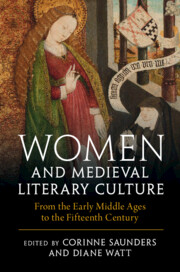Book contents
- Women and Medieval Literary Culture
- Women and Medieval Literary Culture
- Copyright page
- Contents
- Illustrations
- Contributors
- Acknowledgements
- Introduction
- I Patrons, Owners, Writers, and Readers in England and Europe
- II Circles and Communities in England
- Chapter 4 Ancrene Wisse, the Katherine Group, and the Wooing Group as Textual Communities, Medieval and Modern
- Chapter 5 Syon Abbey and the Birgittines
- Chapter 6 What the Paston Women Read
- III Health, Conduct, and Knowledge
- IV Genre and Gender
- V Women as Authors
- General Index
- Index of Manuscripts
- References
Chapter 6 - What the Paston Women Read
from II - Circles and Communities in England
Published online by Cambridge University Press: 28 July 2023
- Women and Medieval Literary Culture
- Women and Medieval Literary Culture
- Copyright page
- Contents
- Illustrations
- Contributors
- Acknowledgements
- Introduction
- I Patrons, Owners, Writers, and Readers in England and Europe
- II Circles and Communities in England
- Chapter 4 Ancrene Wisse, the Katherine Group, and the Wooing Group as Textual Communities, Medieval and Modern
- Chapter 5 Syon Abbey and the Birgittines
- Chapter 6 What the Paston Women Read
- III Health, Conduct, and Knowledge
- IV Genre and Gender
- V Women as Authors
- General Index
- Index of Manuscripts
- References
Summary
This essay explores the unique insights into the lives and book ownership of the Paston family offered by its fifteenth-century correspondence. It looks at three Paston women ߝ Agnes Berry Paston, her daughter-in-law Margaret Mautby Paston, and Margaretߣs daughter Elizabeth Paston (Yelverton) ߝ and the books that were in their possession or that they may have read. Putting the evidence concerning book ownership provided by wills, for example, alongside that of letters provides intriguing insights into the spirituality and influence of women, and the value they placed on devotional and moral works. The Paston womenߣs reading also included secular romance, the interest of which may have been as much political as personal. The reading interests of such women, then, extended far beyond the narrowly domestic.
- Type
- Chapter
- Information
- Women and Medieval Literary CultureFrom the Early Middle Ages to the Fifteenth Century, pp. 124 - 138Publisher: Cambridge University PressPrint publication year: 2023
References
Further Reading
- 1
- Cited by

